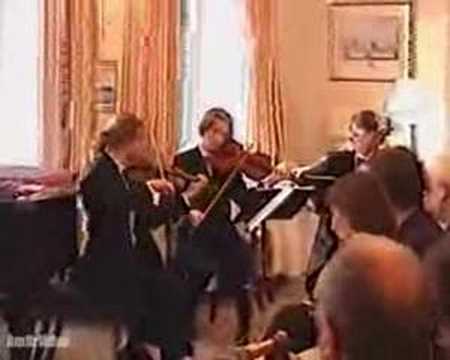Johann Strauss II – The Merry War (1881).
Throughout much of 1881 Vienna’s pressmen enjoyed a field day recording the various musical projects upon which Johann Strauss was reported to be working. By no means did all these projects come to fruition: for example, in April he was reported to have promised a ballet score for the Hof-Operntheater and in March he was understood to have started composing an operetta by the French librettist Néolès Alfred Hennequin (1842-87). On 16 February 1881, however, the Fremden-Blatt accurately stated that the highly successful librettist «firm» of F. Zell (real name: Camillo Walzel, 1829-95) and Richard Genée (1823-95) had drafted a new libretto for the composer. Indeed, Strauss had begun work on Zell and Genée’s latest offering immediately after the 150th jubilee performance of Die Fledermaus at the Theater an der Wien on 8 February 1881, an event which the eminent conductor and composer Hans von Bülow (1830-94) had attended as Johann’s special guest.
As is clear from a report in the Fremden-Blatt on 2 July 1881, Strauss made rapid progress with the new operetta, the title of which had been revealed in May to be Der lustige Krieg (The Merry War). At a gathering on 30 June 1881 at Johann’s country retreat in Schonau-bei-Leobersdorf, Lower Austria, the composer was joined by Franz Steiner (1855-1920), Director of the Theater an der Wien, and the two librettists. Zell passed around the complete libretto, while Strauss astonished his guests by announcing that he had already composed two acts of the operetta. It was thereupon agreed that Der lustige Krieg would be presented as the theatre’s main attraction during its next season, probably around December 1881. Only a month after its initial report the Fremden-Blatt (3.08.1881) announced that work on the operetta had progressed so swiftly that it was hoped to present it during November 1881.
Rehearsals for Der lustige Krieg commenced on 31 October, and the curtain of the Theater an der Wien duly rose on the premiere of the new three-act Strauss operetta on Friday 25 November 1881. The performance and the work exceeded all expectation, and there was universal praise for the cast which included Therese von Braunecker-Schäfer (as Artemisia), Caroline Finaly (Violetta), Alexander Girardi (Marchese Filippo Sebastiani), Ferdinand Schütz (Umberto Spinola) and Felix Schweighofer (Balthasar Groot). The stage work is set in and around the garrisoned Mediterranean city of Massa during the first half of the 18th century, and concerns a dispute between two states. The ‘war’ between them is played out as a game of love between, on the one side, the widowed Countess Violetta and, on the other side, the commander-in-chief of the Genoese army, Colonel Umberto Spinola. To add to the carefree atmosphere of this unwarlike and highly improbable tale, there is no bloodshed among the opposing troops of Massa-Carrara and Genoa, for there is no actual fighting in this «merry war».
Johannes Brahms (1833-97), who attended the dress rehearsal on 24 November, enthused to the composer and critic Richard Heuberger (1850-1914) about «all kinds of fine stuff» to be heard in Der lustige Krieg, though strangely he could not detect one ‘hit’ in the score. (Quoted from Richard Heuberger: Erinnerungen an Johannes Brahms. Edited by Kurt Hofmann, Tutzing 1976). The reporter for the Fremden-Blatt newspaper (26.11.1881), however, expressed no such reservations, and plundered his lexicon for pertinent martial terms: «‘The war’ [= Der Krieg] to which Johann Strauss has supplied the merry [= lustige] music, ended with a thoroughly splendid victory and a complete triumph for the celebrated, popular Viennese maestro. On this occasion the composer has selected the surest weapons from the arsenal of his invention and imagination, has sent into battle a legion of charming melodies and has totally captivated the public with them. The public, however, was awarded a victory prize in the memory of the superb music which will this season dominate the concert- and ball room, the programmes of the military bands, and will be played and sung in all possible arrangements wherever a piano is to be found … The operetta was received enthusiastically. Johann Strauss was greeted by a long-lasting storm of applause, which was repeated during the overture when the first waltz [the Act 1 Quintet, «Kommen und geh’n, ohne zu seh’n»] resounded, and at the end of it».
Johann Strauss, who conducted the première of Der lustige Krieg on 25 November 1881, was applauded tempestuously after the playing of the overture. Just over two weeks later, on 11 December 1881, the piece triumphed again when the composer also conducted its first concert performance during his brother Eduard’s Sunday benefit concert with the Strauss Orchestra in the Golden Hall of the Musikverein.
















